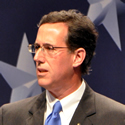National
GOP candidates split wins on Super Tuesday
No clear front-runner after biggest night of primary season

The field of Republican presidential candidates didn’t become any more clear Tuesday night after results were declared for the largest number of contests on a single day during the GOP primary season.
On Super Tuesday, when 10 states held primaries to award a total of 437 delegates, each of the Republican candidates who had previously won states — former Massachusetts Gov. Mitt Romney, former U.S. Sen. Rick Santorum and former U.S. House Speaker Newt Gingrich — took claim to new victories. Libertarian Rep. Ron Paul (R-Texas) didn’t win any states.
Romney won six states: Alaska, Ohio, Massachusetts, Vermont, Idaho and Virginia. Santorum had three in his column: Tennessee, North Dakota and Oklahoma. Gingrich picked up a win in his home state of Georgia.
The contest in Ohio was the most highly contested between Romney and Santorum. A winner in the state, where total of 66 delegates were up for grabs, wasn’t declared until after midnight.
With 99 percent of precincts reporting, Romney won 38 percent of the vote, while Santorum had 37 percent. The win for Romney was narrow even though he reportedly outspent Santorum in Ohio by a 12 to 1 ratio.
Ed Mullen, executive director of Equality Ohio, said a win for Romney was more favorable than a win for the more anti-gay Santorum.
“While Gov. Romney has expressed anti-LGBT positions during the campaign, it is heartening to see that Ohioans rejected the radical anti-LGBT positions of Rick Santorum, who traveled the state with Maggie Gallagher,” Mullen said.
Gallagher, founder of the National Organization for Marriage and one of the most high-profile anti-gay activists, campaigned with Santorum in Ohio and spoke on his behalf at rallies.
But Romney’s other wins aren’t surprising. Massachusetts is the state where Romney has served in his highest capacity as a government official, and Vermont is nearby in geography and Republicans there have a similar temperament. Idaho has a large presence of Mormons, which is Romney’s religion. In Virginia, Romney was one of two candidates on the ballot along with Paul.
Kara Suffredini, executive director of MassEquality, said Romney’s win in Massachusetts “was not unexpected” as she cautioned a Romney presidency would “be very bad news for LGBT people across America.”
“To go from President Barack Obama, who has accomplished more than any president in U.S. history to embrace the full dignity of LGBT people across the United States and around the globe, to former Massachusetts Gov. Mitt Romney, who has actively opposed justice for LGBT youth and families at every turn, would be a tremendous setback for LGBT Americans,” Suffredini said.
As governor, Romney opposed a Massachusetts Supreme Court granting same-sex couples the right to marry and renewed enforcement of a 1913 anti-miscegenation law to block gay couples from other states from coming to the state to marry. According to MassEquality, Romney abolished the Governor’s Commission on GLBT Youth and rescinded an executive order prohibiting sexual orientation discrimination in the state workforce. Another Republican, former Gov. William Weld, had put those measures in place.
Despite the split wins among the candidates, Romney still has the lead in terms of total delegates won in the Republican primary. According to the Associated Press, Romney has 212 while Santorum has 84, Gingrich has 72 and Paul has 22.
Jimmy LaSalvia, executive director of GOProud, said Romney has won “the lion’s share of delegates at stake” and Super Tuesday “all but guarantees that Romney will be the eventual nominee of the Republican Party.” LaSalvia has personally endorsed the candidate in the Republican primary.
“Obviously this process is technically not over,” LaSalvia said. “Despite the large delegate lead enjoyed by Gov. Romney, other candidates in the field have made it clear that they intend to continue on. The question that Republicans, and conservatives in particular, must begin to ask themselves is whether continuing this process is in the best interest of our movement, the party and – most importantly – our country.”
LaSalvia also took a dig at President Obama, saying he and “the left” are “fanning the flames of the culture wars” to distract Americans from economic issues facing the country.
Heads of LGBT groups in Tennessee and Oklahoma said they weren’t surprised Santorum won in their states because they said his anti-gay message resonate with voters there.
Chris Sanders, chair of Tennessee Equality Project’s Nashville Committee, said Tennessee’s LGBT community “is disgusted but not surprised” with Santorum’s win.
“Santorum’s comments about our community track closely with the kind of anti-equality legislation we’re fighting in this state,” Sanders said. “The results show that we have significant work to do in Tennessee if we are going to move the culture in favor of equality and away from the worst discriminatory policies and rhetoric.”
Tennessee State Sen. Stacey Campfield was among those who came to support Santorum even though the lawmaker was initially Gingrich’s co-chair of his Tennessee. He’s sponsor of the legislation commonly known as the “Don’t Say Gay” bill, which would prohibit discussion about homosexuality in schools from kindergarten through eighth grade.
Toby Jenkins, executive director of Oklahomans for Equality, also he’s “not surprised” with Santorum’s win in his state.
“He used a lot of buzzwords and fear statements that are people out here in this part of the country identify with because he panders to their worst fears and makes all sorts of outrageous suggestions about the LGBT community,” Jenkins said. “The reality is we’re not some outside force. Most of us out here are products of Oklahoma.”
Santorum has made his opposition to LGBT rights — in particular his opposition to same-sex marriage — well-known throughout his campaign across the country.
Jenkins said he isn’t aware of any anti-gay rhetoric from Santorum while he was in the state, but heard reports of people who were escorted out of his events because they pressed him on social issues.
Each of the Republican candidates who’ve won states have staked out anti-gay positions. Romney, Santorum and Gingrich have a signed a pledge from the National Organization for Marriage committed themselves upon election to the White House to backing a Federal Marriage Amendment, defending the Defense of Marriage Act and setting up a commission on religious freedom to investigate alleged harassment of opponents of same-sex marriage.
Santorum has said he’d reinstate “Don’t Ask, Don’t Tell,” while Gingrich has said he’d order an “extensive review” of going back to the policy. Romney said he has no plans to return to “Don’t Ask, Don’t Tell.”
The next major contest will take place on Saturday in Kansas, where 40 delegates are in play. The U.S. protectorates, Guam, Northern Mariana Islands and the U.S. Virgin Islands, are also set to hold conventions.
NOTE: This post has been updated.
The White House
Four states to ignore new Title IX rules protecting transgender students
Biden administration last Friday released final regulations

BY ERIN REED | Last Friday, the Biden administration released its final Title IX rules, which include protections for LGBTQ students by clarifying that Title IX forbids discrimination based on sexual orientation and gender identity.
The rule change could have a significant impact as it would supersede bathroom bans and other discriminatory policies that have become increasingly common in Republican states within the U.S.
As of Thursday morning, however, officials in at least four states — Oklahoma, Louisiana, Florida, and South Carolina — have directed schools to ignore the regulations, potentially setting up a federal showdown that may ultimately end up in a protracted court battle in the lead-up to the 2024 elections.
Louisiana State Superintendent of Education Cade Brumley was the first to respond, decrying the fact that the new Title IX regulations could block teachers and other students from exercising what has been dubbed by some a “right to bully” transgender students by using their old names and pronouns intentionally.
Asserting that Title IX law does not protect trans and queer students, Brumley states that schools “should not alter policies or procedures at this time.” Critically, several courts have ruled that trans and queer students are protected by Title IX, including the 4th U.S. Circuit Court of Appeals in a recent case in West Virginia.
In South Carolina, Schools Supt. Ellen Weaver wrote in a letter that providing protections for trans and LGBTQ students under Title IX “would rescind 50 years of progress and equality of opportunity by putting girls and women at a disadvantage in the educational arena,” apparently leaving trans kids out of her definition of those who deserve progress and equality of opportunity.
She then directed schools to ignore the new directive while waiting for court challenges. While South Carolina does not have a bathroom ban or statewide “Don’t Say Gay or Trans” law, such bills continue to be proposed in the state.
Responding to the South Carolina letter, Chase Glenn of Alliance For Full Acceptance stated, “While Supt. Weaver may not personally support the rights of LGBTQ+ students, she has the responsibility as the top school leader in our state to ensure that all students have equal rights and protections, and a safe place to learn and be themselves. The flagrant disregard shown for the Title IX rule tells me that our superintendent unfortunately does not have the best interests of all students in mind.”
Florida Education Commissioner Manny Diaz also joined in instructing schools not to implement Title IX regulations. In a letter issued to area schools, Diaz stated that the new Title IX regulations were tantamount to “gaslighting the country into believing that biological sex no longer has any meaning.”
Governor Ron DeSantis approved of the letter and stated that Florida “will not comply.” Florida has notably been the site of some of the most viciously anti-queer and anti-trans legislation in recent history, including a “Don’t Say Gay or Trans” law that was used to force a trans female teacher to go by “Mr.”
State Education Supt. Ryan Walters of Oklahoma was the latest to echo similar sentiments. Walters has recently appointed the right-wing media figure Chaya Raichik of Libs of TikTok to an advisory role “to improve school safety,” and notably, Raichik has posed proudly with papers accusing her of instigating bomb threats with her incendiary posts about LGBTQ people in classrooms.
The Title IX policies have been universally applauded by large LGBTQ rights organizations in the U.S. Lambda Legal, a key figure in fighting anti-LGBTQ legislation nationwide, said that the regulations “clearly cover LGBTQ+ students, as well as survivors and pregnant and parenting students across race and gender identity.” The Human Rights Campaign also praised the rule, stating, “rule will be life-changing for so many LGBTQ+ youth and help ensure LGBTQ+ students can receive the same educational experience as their peers: Going to dances, safely using the restroom, and writing stories that tell the truth about their own lives.”
The rule is slated to go into effect Aug. 1, pending any legal challenges.
****************************************************************************

Erin Reed is a transgender woman (she/her pronouns) and researcher who tracks anti-LGBTQ+ legislation around the world and helps people become better advocates for their queer family, friends, colleagues, and community. Reed also is a social media consultant and public speaker.
******************************************************************************************
The preceding article was first published at Erin In The Morning and is republished with permission.
Pennsylvania
Malcolm Kenyatta could become the first LGBTQ statewide elected official in Pa.
State lawmaker a prominent Biden-Harris 2024 reelection campaign surrogate

Following his win in the Democratic primary contest on Wednesday, Pennsylvania state Rep. Malcolm Kenyatta, who is running for auditor general, is positioned to potentially become the first openly LGBTQ elected official serving the commonwealth.
In a statement celebrating his victory, LGBTQ+ Victory Fund President Annise Parker said, “Pennsylvanians trust Malcolm Kenyatta to be their watchdog as auditor general because that’s exactly what he’s been as a legislator.”
“LGBTQ+ Victory Fund is all in for Malcolm, because we know he has the experience to win this race and carry on his fight for students, seniors and workers as Pennsylvania’s auditor general,” she said.
Parker added, “LGBTQ+ Americans are severely underrepresented in public office and the numbers are even worse for Black LGBTQ+ representation. I look forward to doing everything I can to mobilize LGBTQ+ Pennsylvanians and our allies to get out and vote for Malcolm this November so we can make history.”
In April 2023, Kenyatta was appointed by the White House to serve as director of the Presidential Advisory Commission on Advancing Educational Equity, Excellence and Economic Opportunity for Black Americans.
He has been an active surrogate in the Biden-Harris 2024 reelection campaign.
The White House
White House debuts action plan targeting pollutants in drinking water
Same-sex couples face higher risk from environmental hazards

Headlining an Earth Day event in Northern Virginia’s Prince William Forest on Monday, President Joe Biden announced the disbursement of $7 billion in new grants for solar projects and warned of his Republican opponent’s plans to roll back the progress his administration has made toward addressing the harms of climate change.
The administration has led more than 500 programs geared toward communities most impacted by health and safety hazards like pollution and extreme weather events.
In a statement to the Washington Blade on Wednesday, Brenda Mallory, chair of the White House Council on Environmental Quality, said, “President Biden is leading the most ambitious climate, conservation, and environmental justice agenda in history — and that means working toward a future where all people can breathe clean air, drink clean water, and live in a healthy community.”
“This Earth Week, the Biden-Harris Administration announced $7 billion in solar energy projects for over 900,000 households in disadvantaged communities while creating hundreds of thousands of clean energy jobs, which are being made more accessible by the American Climate Corps,” she said. “President Biden is delivering on his promise to help protect all communities from the impacts of climate change — including the LGBTQI+ community — and that we leave no community behind as we build an equitable and inclusive clean energy economy for all.”
Recent milestones in the administration’s climate policies include the U.S. Environmental Protection Agency’s issuance on April 10 of legally enforceable standard for detecting and treating drinking water contaminated with polyfluoroalkyl substances.
“This rule sets health safeguards and will require public water systems to monitor and reduce the levels of PFAS in our nation’s drinking water, and notify the public of any exceedances of those levels,” according to a White House fact sheet. “The rule sets drinking water limits for five individual PFAS, including the most frequently found PFOA and PFOS.”
The move is expected to protect 100 million Americans from exposure to the “forever chemicals,” which have been linked to severe health problems including cancers, liver and heart damage, and developmental impacts in children.
An interactive dashboard from the United States Geological Survey shows the concentrations of polyfluoroalkyl substances in tapwater are highest in urban areas with dense populations, including cities like New York and Los Angeles.
During Biden’s tenure, the federal government has launched more than 500 programs that are geared toward investing in the communities most impacted by climate change, whether the harms may arise from chemical pollutants, extreme weather events, or other causes.
New research by the Williams Institute at the UCLA School of Law found that because LGBTQ Americans are likelier to live in coastal areas and densely populated cities, households with same-sex couples are likelier to experience the adverse effects of climate change.
The report notes that previous research, including a study that used “national Census data on same-sex households by census tract combined with data on hazardous air pollutants (HAPs) from the National Air Toxics Assessment” to model “the relationship between same-sex households and risk of cancer and respiratory illness” found “that higher prevalence of same-sex households is associated with higher risks for these diseases.”
“Climate change action plans at federal, state, and local levels, including disaster preparedness, response, and recovery plans, must be inclusive and address the specific needs and vulnerabilities facing LGBT people,” the Williams Institute wrote.
With respect to polyfluoroalkyl substances, the EPA’s adoption of new standards follows other federal actions undertaken during the Biden-Harris administration to protect firefighters and healthcare workers, test for and clean up pollution, and phase out or reduce use of the chemicals in fire suppressants, food packaging, and federal procurement.
-

 State Department3 days ago
State Department3 days agoState Department releases annual human rights report
-

 Maryland5 days ago
Maryland5 days agoJoe Vogel campaign holds ‘Big Gay Canvass Kickoff’
-

 District of Columbia1 day ago
District of Columbia1 day agoCatching up with the asexuals and aromantics of D.C.
-

 Politics4 days ago
Politics4 days agoSmithsonian staff concerned about future of LGBTQ programming amid GOP scrutiny













